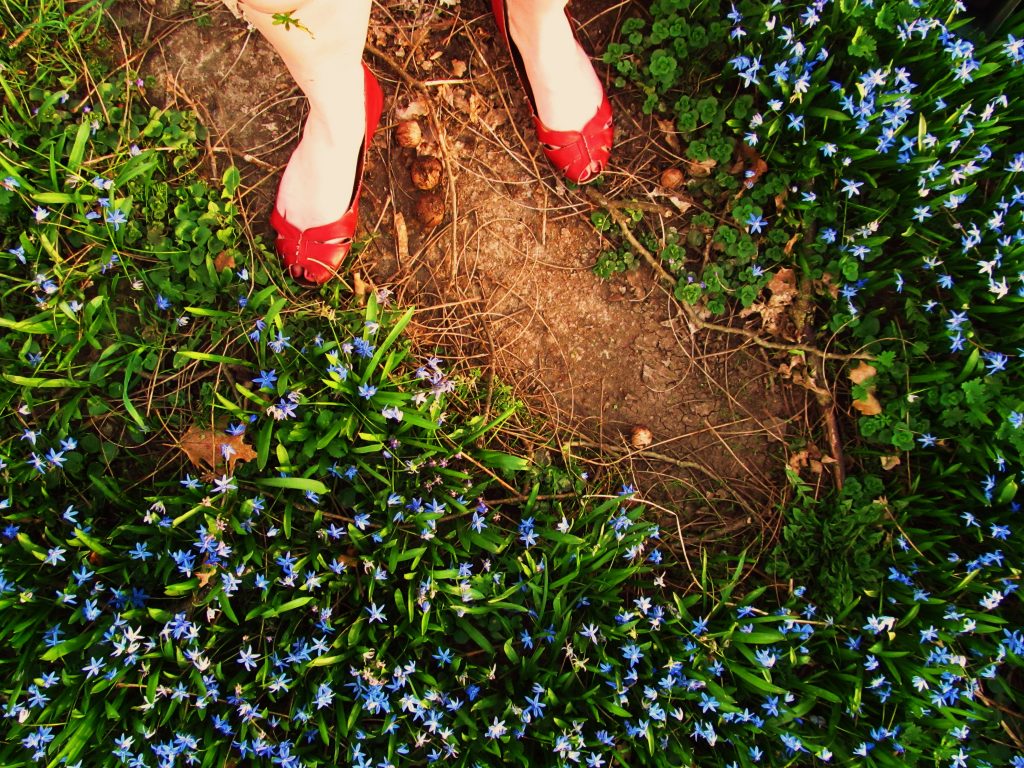Today, I can sense the earth tilting towards spring: cardinals singing loudly in the neighborhood spruce, new shoots of grass in the damp earth, highs in the low 40s. The days are longer. Even when it’s cold out, the sun feels stronger on the top of my head, the tip of my nose. Yesterday, my boyfriend and I even sat outside on our porch, drinking coffee. We sat there for a long time, allowing the new sun to pinken our faces and forearms, talking about this and that, then not talking, just sitting and watching, before it got cold and we went back inside.
How hard it’s been, winter. Putting on our hats and coats and long-johns and gloves and scarves and mittens. Paying the heating bill. Slipping on black ice. Trudging to work before the half-hearted sun comes up. Of course, there have been some pleasures (full moons over snow, red wine), but, by March, aren’t we through with all that? Aren’t we ready for something else entirely: some softening, some respite, some real warmth?
Around this time of year, I can’t help but think of Louise Glück’s poem “The Wild Iris,” which begins with this couplet of tough, spring hope: “At the end of my suffering/ there was a door.” I like to revisit this poem in March to remind myself that winter—this frozen, snowy state we’re in—must end. I especially like Glück’s tacit suggestion that in order to find the “door” out of suffering we must surrender to it, allow it its rightful season, however cold and long:
The Wild Iris
At the end of my suffering
there was a door.
Hear me out: that which you call death
I remember.
Overhead, noises, branches of the pine shifting.
Then nothing. The weak sun
flickered over the dry surface.
It is terrible to survive
as consciousness
buried in the dark earth.
Then it was over: that which you fear, being
a soul and unable
to speak, ending abruptly, the stiff earth
bending a little. And what I took to be
birds darting in low shrubs.
You who do not remember
passage from the other world
I tell you I could speak again: whatever
returns from oblivion returns
to find a voice:
from the center of my life came
a great fountain, deep blue
shadows on azure seawater.
–from The Wild Iris. Ecco Press, 1993.
One of the beauties of this resurrection poem is how it functions as both a narrative of a flower blooming as well a narrative of a person emerging from her own winter’s suffering.
As we melt into Easter, I’m reminded of the sweetness of resurrection: the notion that someone we love so tenderly can return to us—their body whole, all hurts and pains and wounds erased. A week after my aunt died eleven years ago, I dreamed she came back: she was wearing a gorgeous dress; she was laughing. As I look out my window, to lumps of gray snow and patches of brownish grass and the energy still sleeping underground, I remember her—and all the other people I’ve loved who have died. I let the image of Glück’s “great fountain” stay with me for a while.
Photograph of the author in her backyard, last spring.

